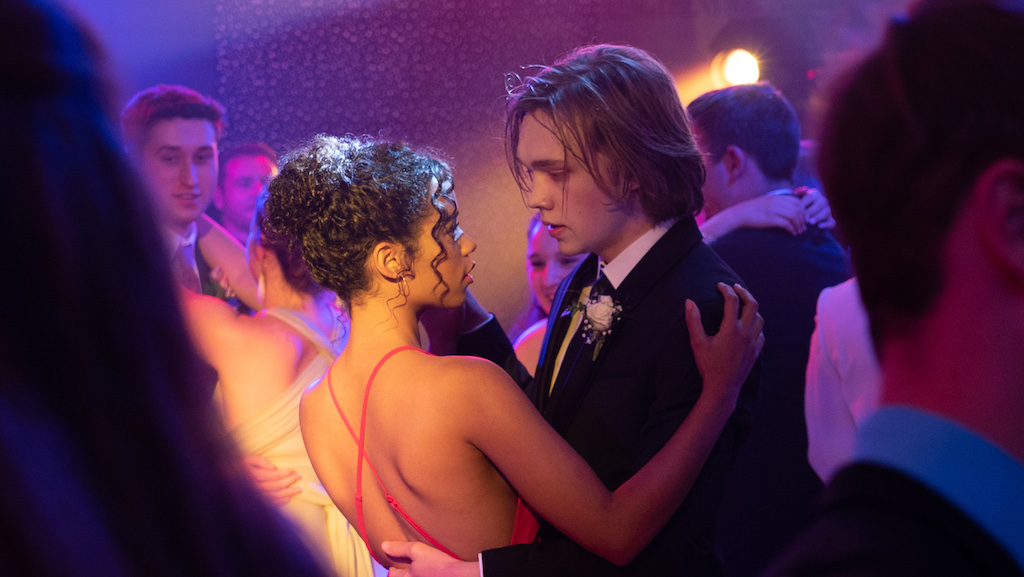
Words on Bathroom Walls shouldn’t have worked. For large chunks of the film, its depiction of mental illness is overly facile, bordering on cutesy.
Our teenage hero, Adam (Charlie Plummer), has just been diagnosed with schizophrenia. In his case, that manifests as not just visions and voices and paranoid delusions, but invisible buddies—seen only by him—that wouldn’t be out of place in a jokey Marvel pic. There’s Rebecca (AnnaSophia Robb), a Coachella-ready flower child, always dispensing words of new age wisdom. There’s Joaquin (Devon Bostick), a girl-crazy stoner wingman. And then there’s his bruising, bald-headed Bodyguard (Lobo Sebastian), the only slightly menacing one of the three, who is nonetheless there to protect him.
Needless to say, schizophrenia does not actually manifest in the form of movie-ready sidekicks.
But again, hear me out, Words on Bathroom Walls still manages to work, partly because it’s presented with such heartfelt conviction—and partly because the sidekicks are used sparingly.
Also, very much to the film’s credit, Adam’s schizophrenia is not “cured” (there is no cure), nor is this one of those films where a mentally ill person throws away his pills because he’s his truest and most creative self when he’s off them (although it flirts with that). And ultimately, what Words on Bathroom Walls does, expertly, is humanize schizophrenia, make us care very deeply for Adam (Plummer is excellent), while also showing how scary and traumatizing it can be for both the sick person and those who love him.
Adam, a budding chef, is starting at a new school—after a “nervous breakdown” at this last school, his classmates cruelly began bullying him and calling him “straightjacket” until he was forced to drop out. The new headmistress, a nun (it’s a Catholic school), knows that he’s sick, but his classmates don’t. He’s part of a new drug trial—the drugs help with the visions, but they also mess with his palate, ruinously—and the terms of his enrollment are that he stay on the drugs, which seems illegal, but what do I know?
He meets a girl, Maya (Taylor Russell), the school valedictorian who has a little side hustle going on—she sells tests and essays to her peers (at first Adam thinks she’s selling drugs). She’s bright and quick-witted and cynical and she’s drawn to the sensitive and dreamy Adam, despite thinking he’s weird (or perhaps because of that). The fact that Maya comes from a low-income family but tries to conceal it from Adam is an unnecessary bit of John Hughes-esque piffle—and a scene where Adam shows up at her home and whips up a chicken pot pie for her family (saving them from the TV dinners they would otherwise be condemned to) is more than a little ridiculous. (“It’s amazing what ingredients people just have lying around the house,” Adam says, by way of explanation.) Still, the romance between these two intelligent teens works.
Adam has a worried, loving mother who can often be seen hunched over a computer reading about schizophrenia, played by the always welcome Molly Parker, and a would-be stepfather, Paul (Walton Goggins), who ends up being the focus of Adam’s most paranoid obsessions. (He thinks Paul wants to send him away to a mental institution.) The evolution of Adam’s relationship with Paul is handled with patience and care.
One of the film’s great characters is a priest that Adam must confess to at school—despite the fact that Adam doesn’t believe in God. The priest, played with both gravity and twinkly wit by Andy Garcia, doesn’t try to turn Adam into a believer—instead he listens to him, with seriousness, mirth, and grace.
So here’s the thing: Despite occasionally turning schizophrenia into something that actually looks like fun, the film, directed nimbly by Thor Freudenthal, with a pop-culture-savvy screenplay by Nick Navada (based on Julia Walton’s novel), also has some disturbing and scary moments. Schizophrenia can be scary—there are times when we’re not totally sure that Adam, otherwise a total sweetheart, won’t hurt himself or, God forbid, someone else. The film has one of the most unusual prom scenes I’ve ever seen in a teen drama—instead of being the happy denouement of Adam and Maya’s budding romance, it’s a horrific nightmare as Adam tries to power through a paranoid episode.
It’s funny that a film can be both overly facile and clear-eyed at the same time, but Words on Bathroom Walls is just that. I’ve seen lots of films about mental illness that were filled with histrionics and darkness and gloom. Words on Bathroom Walls takes a more practical approach—mental illness sucks and but you can find ways to live with it. And maybe even get the girl.
Words on Bathroom Walls is playing exclusively in theaters. Check your listings.
